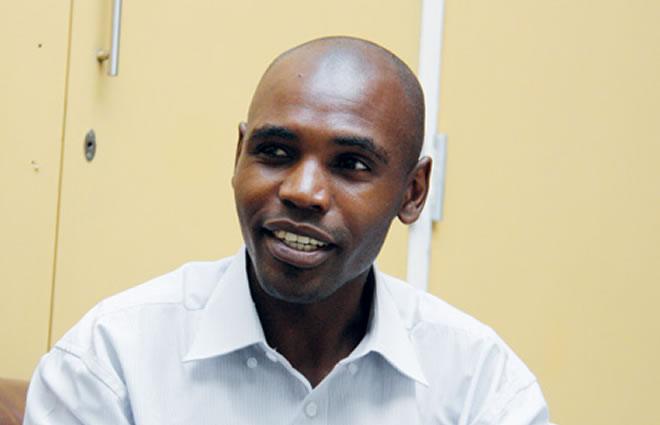
Mule Yesse was abducted January 11, 2012, when about 100 al-Shabaab fighters stormed the Administration Police camp at Gerile, in Kenya's Wajir South district, where he was posted as a district officer.

By Moses Michira
Thursday, February 27, 2014
NAIROBI, KENYA: Six months have passed since Yesse Mule, Kenya’s highest-profile Al-Shabaab hostage, was freed by the militants.
Mule, who looked sickly upon his release after spending 566 days in custody, can now walk on his own and is even able to narrate his ordeal – with a smile.
Armed militiamen abducted him and a colleague from their workstation in Wajir South, where he was overseeing the issuing of national ID cards.
“It felt like a different world when I was set free but the experience has only served to make me stronger. I have learnt to appreciate everything around me better; you can’t take anything for granted,” Mule, who is now 33, reflects.
He was awarded the Silver Star of Kenya Presidential commendation last December for his service and endurance. But though physically recovered, his eye sockets are still sunken, an indicator of the torture and pain he experienced at the hands of Al-Shabaab.
“I could be weaker in body but my convictions are much deeper. It is an experience I would not wish even my worst enemy to go through,” he says as he describes the Al-Shabaab as a well-organised entity that rules much of Somalia through a clear structure.
Mule says the militia would often parade him, alongside immigration officer Fredrick Wainaina, with whom he was captured, to convey their demands to Kenyan authorities. These displays offered the two captives contact with the outside world.
He is, however, yet to regain his full energy, saying his bones are still feeble.
“It was almost like learning how to walk all over again after suffering severe malnutrition, which saw my body tissue and bones wasted,” he says.
FEAR MIRROR
Mule has been diagnosed with rheumatoid arthritis, a chronic inflammatory disorder that affects small joints in the hands and feet, which hinders his ability to perform his duties in his current job, which involves extensive movement.
The junior county commissioner, who now works in Malindi but without a substantive office, is struggling to fill the void created by the 19 months he was held in Somalia.
He sometimes fears looking in the mirror because the person staring back at him is unfamiliar. He says he lost 30kg while in custody.
“The psychological torment and the poor food were harrowing. The diet consisted of a plate of either rice or spaghetti and a bottle of water,” he recounts.
While in custody, life came to a standstill and was monotonous. Captives had their legs chained most of the time and were blindfolded.
Only once did he get a sense of ‘normal’ life when he heard a feminine voice from his cell. He says it made a lot of difference.
“I even stood up to peep just to see who the woman was, but I was not lucky enough to see her and neither could I ask about her.”
He says his days in captivity were dark and miserable as he lived under constant taunts from dozens of militiamen in the various locations where they were held.
The militiamen would often chant songs that depicted the hostages as kafir, the Arabic term that is used in an Islamic doctrinal sense to mean devil or infidel.
However, as disturbing as this was, Mule says it did not break his spirit. “I have a clear conviction that after surviving that ordeal, I am now stronger.”
TERROR GROUP
His parents have since moved from their Buru Buru estate home in Nairobi, where Mule grew up, because it carried the dark memories of their tears while he was in captivity.
He feels heavily indebted to his family for the sacrifices they made to secure his release, especially after the State made it clear it was unwilling to negotiate with the terror group that has since claimed responsibility for other attacks in Kenya.
“I do not know for sure if a ransom was paid for my release,” he says. His family believes he should be recognised and appreciated more because the ordeal has left a permanent scar in his life.
His family believes he should be recognised and appreciated more because the ordeal has left a permanent scar in his life.